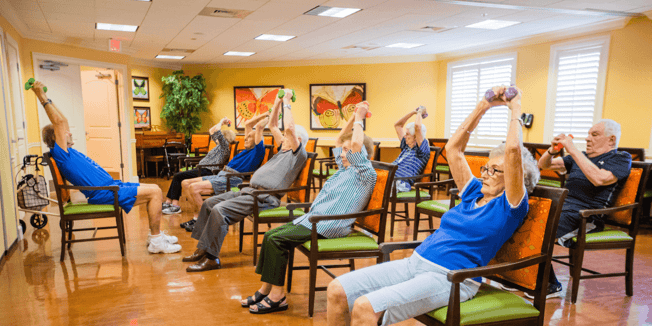Experience high-quality Assisted Living care and support.
Experience high-quality Assisted Living care and support.
Blog Article
Aided Living: a Compassionate Environment for Seniors With Memory Difficulties
By providing personalized treatment and organized routines, these neighborhoods not only boost cognitive function yet likewise foster psychological links, lowering isolation among locals. The performance of these treatments typically pivots on the involvement of households in the treatment procedure, motivating a closer assessment of just how this collaborative effort influences results for both locals and loved ones.
Comprehending Memory Obstacles
Recognizing memory obstacles is vital for providing reliable treatment to seniors dealing with cognitive decline. Memory disabilities, which can materialize as forgetfulness, confusion, or difficulty recalling current occasions, are typically signs of conditions such as Alzheimer's condition or various other types of dementia. These challenges can considerably impact a senior's capability to perform day-to-day tasks, preserve social connections, and handle individual security.
Recognizing the numerous stages of cognitive decrease is essential for caretakers and healthcare professionals. Early-stage amnesia may include moderate lapse of memory, while mid-stage decrease can cause a lot more obvious disorientation and confusion. In late-stage mental deterioration, individuals may shed the capability to connect successfully, requiring thorough assistance and understanding from caregivers.
In addition, memory challenges can stimulate a series of emotional actions, consisting of stress, stress and anxiety, and depression. This demands a compassionate approach to care that focuses on the emotional health of the person. Comprehending the intricacies of memory obstacles allows caregivers to produce tailored methods that improve interaction, promote interaction, and supply a feeling of security. Ultimately, a deep understanding of these challenges is basic to delivering caring and effective look after senior citizens encountering cognitive decline.
Benefits of Assisted Living
Helped living deals many advantages for elders with memory difficulties, supplying a helpful environment that fosters independence while making certain safety and treatment. One of the key benefits is the day-and-night guidance and support offered, which helps reduce threats connected with memory-related concerns. Assisted Living. This continuous support permits senior citizens to engage in everyday activities without the fear of accidents or complication
Additionally, helped living centers commonly supply structured routines that can improve cognitive function and security. These regimens assist homeowners feel more secure and lower stress and anxiety, as they recognize what to expect daily. Social interaction is another significant benefit, as these environments motivate connections amongst locals, promoting emotional wellness and decreasing feelings of isolation.
Furthermore, assisted living staff are educated to recognize the special demands of elders with memory challenges, permitting for individualized care strategies that deal with private preferences and needs. This tailored technique not just boosts the quality of care but additionally empowers elders to keep a sense of autonomy. Generally, assisted living acts as a thoughtful solution, balancing the need for support with the need for self-reliance in the lives of seniors facing memory difficulties.
Specialized Treatment Approaches
Carrying out specialized care approaches is necessary for efficiently sustaining seniors with memory challenges. One essential technique is person-centered care, which emphasizes the importance of understanding each resident's life background, choices, and worths.
Another vital strategy entails making use of cognitive excitement treatments. Tasks developed to improve memory recall, motivate social communication, and promote psychological dexterity can considerably impact residents' general wellness. Methods such as memory therapy take advantage of individual memories to spark conversation and link, while music treatment can stimulate emotions and memories, offering comfort.

Developing a Helpful Community
(Memory Care Facilities Charlotte)A helpful area plays a vital duty in enhancing the lives of elders with memory difficulties. Such an area cultivates an environment of understanding, concern, and inspiration, which is vital for individuals encountering cognitive troubles. By producing a network of assistance, helped living facilities can dramatically enhance the quality of life for residents.
Central to an encouraging area is the visibility of qualified staff that are sensitive to the unique demands of seniors with memory disabilities. These specialists not only give essential care yet additionally engage locals in meaningful activities that stimulate cognitive function and advertise social interaction. Programs that encourage involvement in group exercises, arts and crafts, or memory games can enhance both physical and mental wellness.
Moreover, an encouraging neighborhood promotes strong connections amongst locals. Motivating relationships and peer support helps to minimize sensations of seclusion and promotes a sense of belonging. Routine social occasions and common dining experiences can additionally reinforce these bonds, producing an environment where elders feel valued and understood.
Involving Families in Treatment
Involving family members in the care procedure is vital for providing detailed support to seniors linked here with memory obstacles. Household members typically work as vital supporters, offering insights into the person's choices, background, and regimens that can improve tailored treatment. By including them in conversations and treatment preparation, helped living facilities can produce a more holistic approach that reverberates with the homeowner's demands.

Urging family members to participate in care not just boosts the health of the elderly but additionally supplies psychological support to relative. Involving households in care cultivates a feeling of community and belonging, making sure that seniors feel linked to their loved ones. Eventually, a collaborative technique to care improves the lives of both homeowners and their families, producing a thoughtful and helpful setting that advertises dignity and respect.
Conclusion
In final thought, assisted living serves as an important source for elders experiencing memory difficulties, supplying customized treatment tailored to individual demands. By including families in the care procedure, aided living creates a thorough support network, eventually enriching the lives of residents and their liked ones.
Report this page